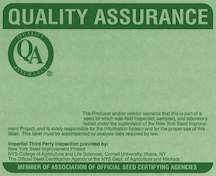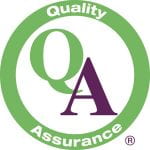Quality Assurance (QA) Program
 The Quality Assurance Program is similar to Certification but is geared specifically for seed producers and companies who need independent, third-party verification of purity and viability of seed but don’t need to, or cannot, produce “blue tag” Certified seed. The QA program is an option for hybrids, brands or blends that would not qualify for Certification but still nonetheless would benefit from verification.
The Quality Assurance Program is similar to Certification but is geared specifically for seed producers and companies who need independent, third-party verification of purity and viability of seed but don’t need to, or cannot, produce “blue tag” Certified seed. The QA program is an option for hybrids, brands or blends that would not qualify for Certification but still nonetheless would benefit from verification.
With the green Quality Assurance labels, the product can be marketed a step above commodities with assurance to the customer that the seed is pure or as advertised, healthy and high quality. Participating in the program also provides an unbiased record system for tracking stock sources while managing collection and payment of royalties and research fees. NYSIP follows the AOSCA QA program guidelines as well as the NY State Standards to administer this program.

ELIGIBILITY REQUIREMENTS
A. Participation in the QA program will be limited to seed producers that have been approved by the New York Seed Improvement Project. See the NYSIP “Seed Producer/Processor Application” on the Forms & Fees page.
B. Product eligibility:
- Public varieties currently marketed as Certified Seed are not eligible to be labeled under NYSIP’s QA program unless authorization is granted by the originating institution.
- A Quality Assurance Program Eligibility Form must be completed for products initially entering NYSIP’s QA program. These will be kept on file by NYSIP. The eligibility form requires that the following be provided:
- An agronomic description of the product sufficient to allow for accurate and reliable field and seed evaluations.
- A declaration of origin of the product, including an affirmation that the customer is authorized to produce this product.
NYSIP QUALITY ASSURANCE (QA) PROTOCOL
1. An Application for Field Inspection is submitted to NYSIP by a qualified grower, identifying the fields to be inspected, proof of planting stock, and an agronomic description of the plant and seed. Products will be accepted as described.
2. QA field inspections are performed using the same field sampling system and field standards as is used for certified seed of the same crop kind. Inspection for genetic purity is based upon the description included on the Quality Assurance Program Eligibility Form. The customer may request that additional factors be included in the inspection.
3. Minimum seed purity and germination standards are the same as those for certified seed of the same crop kind. Samples may be submitted for analysis at an approved laboratory when sampled under an existing compliance agreement for sampling certified seed.
4. Testing that crop is true to type. When required, samples submitted to NYSIP will be placed in post control grow out which tests for genetic purity.
5. QA labels. Once seed meets all of the QA field and laboratory requirements for validation of genetic purity, QA labels will be issued to the grower by NYSIP. The application process for QA tags is is the same as for certified seed. The labels are green in color and have printed on them the QA logo (a registered trademark) the words Quality Assurance; and Member of Association of Official Seed Certifying Agencies. The QA label will be imprinted with kind, variety, brand, blend or hybrid designation. The label will also contain a lot number and may contain a producer number or designation and the phrase “variety not stated” if applicable. Analysis information will be printed on the label upon request.
Non-exclusive products must be labeled under variety-not-stated provisions of state and federal seed laws and identified with brand designations.
Bulk seed movement and sale protocols is the same as for New York Certified Seed. For more information see the NY Seed Standards.
